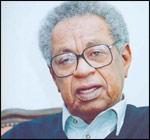 Tayeb Salih authored Season of Migration To The North in 1966; a book that has grown into the enviable position of being a literary classic; translated into twenty languages around the world.
Tayeb Salih authored Season of Migration To The North in 1966; a book that has grown into the enviable position of being a literary classic; translated into twenty languages around the world.
He was a Sudanese novelist, short story writer and a long time broadcaster with the BBC. He died at 80, on 18th February, 2009. Born into the ancient Nubian tribe of the northern province of Sudan (where the River Nile heads towards Egypt), he anchored his famous novel on what his main character, Mustapha Saeed, refers to as "the germ of the greatest European violence... the like of which the world has previously never known" imported into Sudan (and Africa) by European invaders and colonizers. He asserts that the germ was of a "deadly disease" that struck Europeans "a thousand years ago". In the novel this germ mainly infects relationships between a virile African man and white British women; but, secondarily, between black women and black men who had already been infected by a season of migration and an enjoyment of such freedom in the north. His charisma overwhelms the white women he meets; turns each into his slave. It is a force that hits these women with a fury that leaves behind a desert of solitude as each woman experiences no shared sense of human bondage (or love) with Mustapha.
Tayeb came from a history of several migrations. The first was that of his Nubian peoples moving north to the Nile Delta and being part of constructing Ancient Egyptian civilization. The second migration was a horizontal one: that of Arabs surging westwards from the Arabian peninsula to brutally colonize more fertile and richer civilizations from the Nile valley to the Atlantic coast in Morocco. The third involved invading armies of Napoleon 'migrating' their violence southwards into Egypt; followed by British armies defeating the French and Ottoman Turks. The Turks would also push southwards towards the source of the Nile. Their violence would both decimate populations and later provoke the most horrendous violent nationalism out of Sudan with the "Mahdist revolution". Those, like Tayeb, who would migrate north (as colonized peoples already infected with the germ of violence),to seek education in England or France, were, therefore already condemned with hard walls of violence inside them which, like apartheid, characterized the profound failure to connect into a common humanity between former colonizers and former colonized peoples. It is a theme that had been noted by Franz Fanon in relation between Algerian Arabs and French settlers born inside Algeria and in France. V.S. Naipaul had documented similar Spanish barbarism in Trinidad in which indigenous populations had been exterminated.
This theme underlined three hundred years of barbaric racism in South Africa; has been in two invasions and desolations of Iraq and Afghanistan; fueled the Euro-American aided genocide in Rwanda and the slaughter of over five million people in the Democratic Republic of Congo since 1998. It remains resilient. His countrymen in Southern Sudan and Darfur would insist that this germ is in their midst. In this regard, Tayeb Salih talked about educated Africans, Arabs and Asians who "migrate north" to study or live permanently in Europe, as doomed to remain failed humans. His hero Mustapha says : "I am a lie"; unable to hold hands with the humanity in those who took a peculiar violence to these corners of the earth as European racism and economic greed rolled out.
Paradoxically, when he died on 18th February, 2009, almost 30 days after Barack Obama had been inaugurated, after being overwhelmingly voted for, as the 44th President of the United States, Tayeb Salih may well have gone with a heart full of song and a face awash with a huge smile, as his words from Season of Migration to the North echoed through his memory:"I thought that if I died at that moment, I would have died as I was born, without volition. All my life I had not chosen, not decided. Now I am making a decision, I choose life". Obama may be that moment when history loses the grip of violence and a wall of silence in relations between two humans; thereby giving Tayeb Salih's voice, once a forlorn cry in the wilderness of London, new significance and depth of vision. May his soul rest in peace.
Daily Trust, Nigeria
25 February 2009
Read More:-